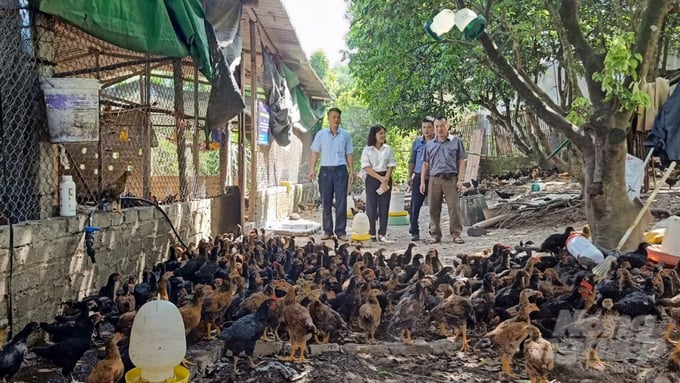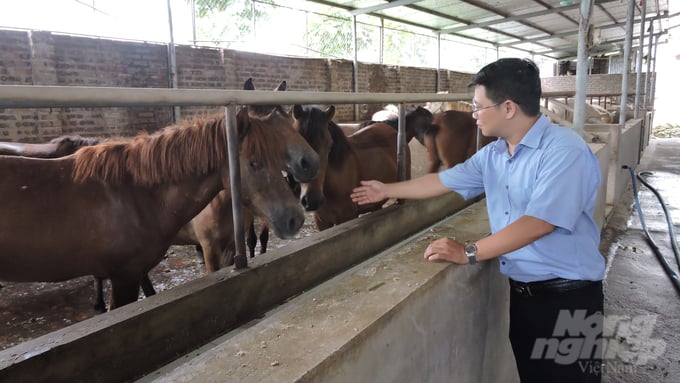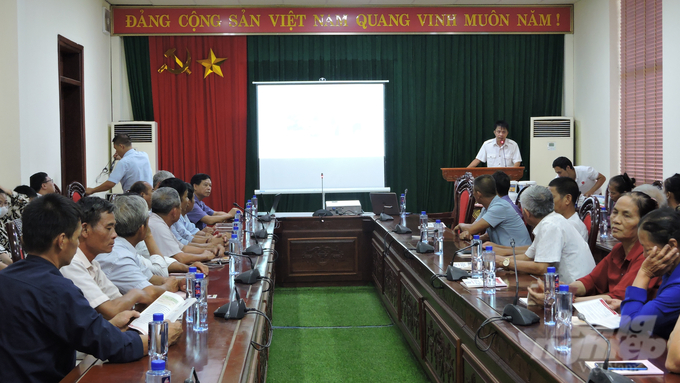June 15, 2025 | 10:56 GMT +7
June 15, 2025 | 10:56 GMT +7
Hotline: 0913.378.918
June 15, 2025 | 10:56 GMT +7
Hotline: 0913.378.918

Bac Giang places special emphasis on hillside chicken farming to ensure disease safety. Photo: Toan Nguyen.
As a province with a vast livestock sector, disease prevention and control for livestock and aquatic animals have been of utmost concern to the provincial People's Committee and the Department of Agriculture and Rural Development in Bac Giang. It is crucial to recognize the outbreak of any disease in livestock which can lead to wide transmission and significant economic losses that are challenging to resolve.
Since the beginning of 2023, the Sub-department of Livestock and Veterinary of Bac Giang has actively collaborated with districts and cities within the province to implement disease prevention and control plans for cattle, poultry, and aquaculture.
The plans include measures to combat African swine fever in Bac Giang province from 2021 to 2025, control lumpy skin disease in cattle and buffalo from 2022 to 2025, and prevention of rabies in animals from 2022 to 2030.
To ensure effective disease prevention, three inspection teams have been established to oversee livestock production and disease control, with responsibilities to examine and guide disease prevention efforts in localities across the province.
Furthermore, they are also focused on prevention, inspection, and addressing violations related to the illegal transportation and trade of livestock, poultry, and their products without proper veterinary inspection and any other related violations.
Mr. Luong Duc Kien, Deputy Director of Sub-department of Livestock Production and Animal Health in Bac Giang, affirmed that since the beginning of 2023 until now, there have been no occurrences of dangerous diseases such as foot-and-mouth disease, blue ear disease, avian influenza, lumpy skin disease, or African swine fever in Bac Giang province.
Other diseases like avian septicemia, Newcastle disease, duck plague, porcine septicemia, and swine erysipelas have sporadically happened in some localities within the province but were promptly controlled and treated, preventing them from becoming outbreaks.

From the beginning of 2023 up to now, in Bac Giang province, there have been no large outbreaks in livestock herds. Photo: Trung Quan.
During the first 6 months of the year, the Sub-department of Livestock and Veterinary of Bac Giang province has collaborated with localities within the province to raise awareness and guide the local people in developing livestock according to the regional planning, ensuring disease safety and biological safety in livestock farming. They have strengthened the care and nurturing of animals, regularly implementing hygiene, detoxification, and disinfection measures in the livestock environment. Additionally, they have administered complete vaccinations for necessary diseases to prevent illnesses in animals.
Additionally, they have enhanced the management and close monitoring of disease outbreaks in livestock, particularly for highly contagious diseases such as African swine fever, foot-and-mouth disease, avian influenza, etc., to promptly detect and handle any cases of disease in animals, preventing outbreaks and minimizing the spread of diseases.

A training course on prevention and control of African swine fever. Photo: Toan Nguyen.
Currently, in the entire province of Bac Giang, there are over 30,600 buffalo, nearly 110,000 cattle, almost 900,000 pigs, and approximately 20 million poultry. The total estimated meat production of various types is nearly 150,000 tons.
In 2023, the Sub-department of the Livestock and Veterinary of Bac Giang province has conducted five training sessions funded by the provincial budget for disease prevention and control, focusing on African swine fever. The target audience for these sessions included pig farmers and veterinary officers in districts with significant pig herds, such as Hiep Hoa, Lang Giang, Viet Yen, Tan Yen, and Yen The. These are the localities known for their livestock-friendly environment and large-scale pig farming in Bac Giang province.
Mr. Nguyen Huy Khanh, Deputy Head of the Technical Division at the Sub-department of Livestock and Veterinary, shared that by August 4th, the final training session was organized in Lang Giang district, successfully completing the training program on African swine fever prevention and control throughout the province.
From the beginning of the year until now, livestock farmers in Bac Giang province have proactively implemented vaccinations with a high coverage rate for various vaccines on their livestock. These vaccinations include 10,680 doses of foot-and-mouth disease vaccine for cattle and buffalo, 15,600 doses of swine fever vaccine, 35,800 doses of swine foot-and-mouth disease vaccine, over 32,000 doses of Newcastle disease vaccine, 165,000 doses of duck plague vaccine, and 600,000 doses of avian influenza vaccine…
Translated by Nguyen Hai Long
![Turning wind and rain into action: [4] Bringing climate bulletins to remote and isolated areas](https://t.ex-cdn.com/nongnghiepmoitruong.vn/608w/files/linhnhp/2025/06/14/1152-z6704423696987_15fd32ffc26d590d204d520c9dac6786-nongnghiep-151141.jpg)
(VAN) The Vietnam Agriculture and Nature Newspaper interviewed Mr. Vu Thai Truong, Acting Head of Climate Change and Environment at UNDP Vietnam, to gain deeper insight into how climate bulletins are delivered to farmers.

(VAN) In Tien Giang, a high-tech shrimp farm has developed a distinctive energy-saving farming model that has yielded promising results.
![Turning wind and rain into action: [3] 300.000 farmers benefit from agro-climatic bulletins](https://t.ex-cdn.com/nongnghiepmoitruong.vn/608w/files/news/2025/06/12/e5a48259d6a262fc3bb3-nongnghiep-125122.jpg)
(VAN) The agro-climatic bulletin has become a valuable tool for farmers in the Mekong Delta. After more than five years of implementation, the initiative is gradually being expanded nationwide.
![Turning wind and rain into action: [2] Providing forecasts to the people](https://t.ex-cdn.com/nongnghiepmoitruong.vn/608w/files/news/2025/06/12/e5a48259d6a262fc3bb3-nongnghiep-103927.jpg)
(VAN) In addition to improving the quality of hydrometeorological forecasts, putting forecast bulletins into practical use is crucial for production and disaster prevention.

(VAN) Blue carbon is receiving attention for its rapid absorption capacity and vast potential. It represents a promising nature-based solution to respond to climate change.
/2025/06/11/3507-1-161904_583.jpg)
(VAN) Seagrass beds and coral reefs serve as 'cradles' that nurture life in the ocean depths, creating rich aquatic resources in Vietnamese waters.
![Turning wind and rain into action: [1] Forecasting for farmers](https://t.ex-cdn.com/nongnghiepmoitruong.vn/608w/files/news/2025/06/11/e5a48259d6a262fc3bb3-nongnghiep-111919.jpg)
(VAN) Weather is no longer just a matter of fate. Forecasts have now become an essential companion for farmers in every crop season.